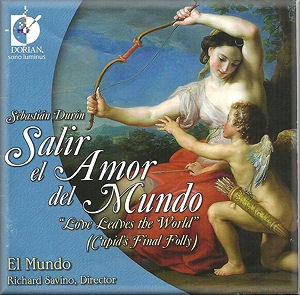 |
 |
|


alternatively
CD:
AmazonUK
AmazonUS
MDT
Sound Samples and Downloads
|
Sebastián DURÓN
(1660-1716)
Salir el Amor del Mundo [36:00]
José NEBRA (1702-1768)
Seguidillas
Juan HIDALGO (1614-1685)
Luceros y flores [3:51]
Xacara de Clarín [3:23]
Ay que sí [2:19]
José MARIN (1619-1699)
Ojos pues me dedeñes [4:37]
Aquella sierra nevada [3:56]
Santiago de MURCIA (1685-c.1732)
/ Anonymous / Martin
SOLER (1729-1783)
Fandango [6:37]
 El Mundo/Richard Savino: Jennifer Ellis Kampani, Nell Snaidas, Ann
Moss, Phoebe Jevtovich, Erica Schuller (soprano), Karen Clark (mezzo),
Paul Shipper (bass, baroque guitar, percussion), Kathryn Adducci
(trumpet), Adam La Motte, Lisa Grodin, Aaron Westman (violin), Richard
Savino, David Zuluaga (baroque guitar, theorbo), John Schneiderman
(baroque guitar, archlute), Avi Stein (harpsichord), John Dornenburg
(viola da gamba), William Skeen (viola da gamba, cello), Kent Reed
(percussion)
El Mundo/Richard Savino: Jennifer Ellis Kampani, Nell Snaidas, Ann
Moss, Phoebe Jevtovich, Erica Schuller (soprano), Karen Clark (mezzo),
Paul Shipper (bass, baroque guitar, percussion), Kathryn Adducci
(trumpet), Adam La Motte, Lisa Grodin, Aaron Westman (violin), Richard
Savino, David Zuluaga (baroque guitar, theorbo), John Schneiderman
(baroque guitar, archlute), Avi Stein (harpsichord), John Dornenburg
(viola da gamba), William Skeen (viola da gamba, cello), Kent Reed
(percussion)
rec. 19-21 August 2009, Skywalker Sound, Marin County, California
Sung texts in Spanish and English
 DORIAN DSL 92107 [62:27]
DORIAN DSL 92107 [62:27] 
|
|
|
Durón was first employed by the Spanish court in 1691 as organist
of the royal chapel; by 1702 he had become maestro de capilla
and also Director of the Royal Choir School. Alongside this
work he wrote prolifically for theatrical performances in Madrid,
and the delightful zarzuela recorded here seems to be one of
the first of such theatrical works. However he backed the wrong
side (the Austrians) in the war of the Spanish Succession and
the Bourbon King had no desire to continue paying his salary,
so that his court posts were terminated in 1706. In 1707 he
was exiled from Madrid … and went to France.
In recording Salir el Amor del Mundo (Love Leaves the World)
Richard Savino has adopted an un-pedantic and healthily interventionist
approach. He has omitted the spoken texts and some of the merely
functional sung texts or incidental pieces. As he explains in
his notes he has chosen, rather, to “‘stitch together’ certain
scenes into cohesive musical numbers and then augment this recording
with additional works”. In the event of a theatrical revival
of Salir el Amor del Mundo some different judgements
would surely be made - I remain a little uneasy about the omission
of the work’s loa or introduction, with its paying of respects
to the royal family. Savino’s approach generally works admirably
here, and the listener benefits from both the synopsis - which
unfortunately isn’t consistently keyed into track numbers correctly
- and libretto and translation provided. The original libretto
was the work of the prolific José de Cañizares (1676 – 1750),
theatrical censor and cavalry officer, who was very much in
sympathy with Durón’s strategy of incorporating motifs from
Italian opera into zarzuela.
Cupid has impudently intruded into the forest of Diana, goddess
of hunting and emblem of chastity. Offended, and concerned about
the safety of her nymphs, she seeks to punish Cupid and calls
on the assistance of Apollo, Mars and Jupiter. After some difficulties,
Cupid is captured and banished to a cave:
En el cóncavo profundo
da un risco colore el rigore
ya que vino al mundo Amor,
que salga el Amor del mundo
(Which John Deredita translates thus: ‘In the deep hollow of
a cliff / Let severity be shown. / Since Cupid came into the
world, / Let Cupid leave the world’).
Savino records the work with a largish ensemble, which plays
with vivacity and supports the singers well throughout. Jennifer
Ellis Kampani is particularly effective as Cupid, shaping Durón’s
melodic lines elegantly while imbuing them with a well-characterised
cheekiness! Karen Clark (as both Diana and Morpheus) is expressive
and assured, and manages to project a firmly moral demeanour
without sounding merely prim. Indeed all the singers – along
with the instrumentalists – impress favourably. They put a persuasive
case for Salir el Amor del Mundo, so much so that they
make one want to hear, or better still, see, a performance of
the whole thing.
There is a good deal of pleasure to be had, too, from the additional
works on the CD. José Marin’s ‘Ojos pues me dedeñais’ a solemn
courtly-love lament is sung by Nell Snaidas (the Jupiter of
Salir el Amor del Mundo) with a fittingly grave sophistication;
Marin’s ‘Aquella sierra nevada’, full of conflicted emotions,
gets a fiery performance from Jennifer Ellis Kampani; Juan Hidalgo’s
‘Aquella sierra nevada’ is expressively interpreted by Erica
Schuller (Mars in the disc’s major work), full of unforced melancholic
dignity.
The whole disc makes a valuable – and enjoyable – contribution
to the growing recorded repertoire of seventeenth-century Spanish
music.
Glyn Pursglove
|
|
|












